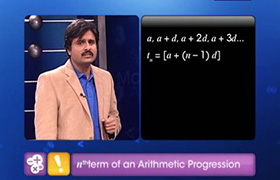CBSE Class 10 Answered
if in an A.P. the sum of m terms equal to n and the sum of n terms is equal to m, then prove that the sum of (m+n) terms is -(m+n)
Asked by ananya_monica | 28 Sep, 2023, 19:07: PM
Let a be the first term and d be the common difference of A.P.
Sum of m terms of A.P

 ..................................(1)
..................................(1)Similarly , sum of n terms of A.P
 ............................... (2)
............................... (2)By solving eqn.(1) and (2) , we get
 ................................... (3)
................................... (3) .........................(4)
.........................(4)Sum of (m+n) terms of A.P is
 ....................... (5)
....................... (5)By substituting initial value a from eqn.(4) and d from eqn.(3) , we get from eqn.(5) after simplification is

Above expression is simplified to

-------------------------------------
Answered by Thiyagarajan K | 28 Sep, 2023, 21:44: PM
Application Videos
Concept Videos
CBSE 10 - Maths
Asked by lp9128437598 | 10 Jun, 2024, 10:34: AM
CBSE 10 - Maths
Asked by deepikaselvam2009 | 20 Feb, 2024, 20:57: PM
CBSE 10 - Maths
Asked by keshavsinghalhapur | 16 Jan, 2024, 20:46: PM
CBSE 10 - Maths
Asked by keshavsinghalhapur | 15 Jan, 2024, 10:56: AM
CBSE 10 - Maths
Asked by skandachiranjeevin | 06 Dec, 2023, 19:08: PM
CBSE 10 - Maths
Asked by prassanna.j | 13 Nov, 2023, 23:24: PM
CBSE 10 - Maths
Asked by latayadav23 | 17 Oct, 2023, 20:39: PM
CBSE 10 - Maths
Asked by ananya_monica | 28 Sep, 2023, 19:07: PM
CBSE 10 - Maths
Asked by simmysingh1aug | 20 Sep, 2023, 22:20: PM
CBSE 10 - Maths
Asked by bkhaiwangkonyak | 07 Mar, 2023, 16:35: PM












